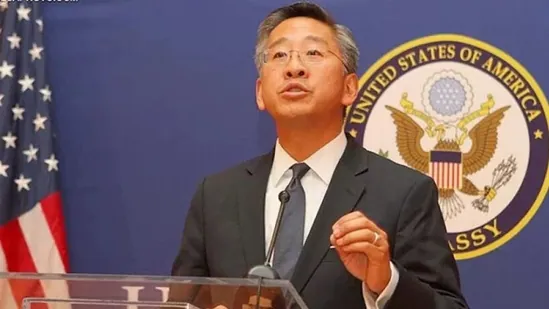In a landmark public appearance, U.S. Assistant Secretary of State for South and Central Asia, Donald Lu, has directly addressed the swirling accusations regarding the alleged involvement of the United States in the removal of Pakistan’s former Prime Minister, Imran Khan, in 2022.
During his testimony before the House Foreign Relations Committee, Lu emphatically denied any American role in orchestrating Khan’s ousting, categorically dismissing the allegations as baseless fabrications. When pressed on the matter by committee Chairman Representative Joe Wilson, Lu reiterated his stance, labeling the claims as a “complete falsehood.”
The controversy stems from assertions made by Khan following his expulsion from power via a parliamentary vote of no confidence in April 2022. Khan alleged that a clandestine diplomatic communication, known as a cipher, purportedly sent by then-Pakistani Ambassador to the U.S., Asad Majeed Khan, provided evidence of collusion between the United States, Pakistan’s military, and opposition factions to facilitate his removal from office. The content of this alleged communication, which was reportedly disclosed by an American news outlet, The Intercept, implied that the U.S. encouraged Khan’s ouster due to his perceived neutrality regarding Russia’s invasion of Ukraine.
Despite persistent claims and media coverage, Lu reiterated the State Department’s consistent rejection of any involvement in Khan’s downfall. He pointed out discrepancies in the reporting of the diplomatic cable, asserting that it neither accused the U.S. government nor him personally of undermining Khan’s leadership. Moreover, Lu highlighted Ambassador Khan’s own testimony to his government, affirming the absence of any U.S. conspiracy.
The situation escalated when Pakistan’s National Security Committee, chaired by Khan, lodged a formal complaint against the U.S. ambassador, alleging interference in the country’s internal affairs. However, subsequent investigations, including one conducted by a committee headed by then-Prime Minister Shehbaz Sharif, concluded that there was no evidence of U.S. involvement in Khan’s removal.
Throughout the proceedings, Lu faced interruptions and accusations from some attendees, resulting in disruptions and the removal of disruptive individuals by Capitol Police. Lu also disclosed that he and his family had received threats in the wake of Khan’s removal, emphasizing the toll of unfounded allegations on personal safety.
Shifting focus to Pakistan’s electoral landscape, Lu addressed concerns regarding irregularities in the February 8 general elections. He reiterated the Biden administration’s call for a transparent investigation into reported irregularities and emphasized the importance of holding those responsible accountable. The delayed and contentious elections, marked by violence and delays in announcing results, prompted calls from international partners, including the United States, for a thorough probe.
Despite initial reservations expressed by some members of Congress, the Biden administration ultimately extended recognition to Sharif’s government, signifying a willingness to engage with Pakistan’s leadership. Lu clarified that recognition decisions are contingent upon engagement rather than unilateral acknowledgment.
In the aftermath of Pakistan’s elections, characterized by a fractured political landscape and coalition formations, the U.S. continues to navigate its diplomatic relationship with the country amid ongoing challenges and scrutiny over electoral integrity.


